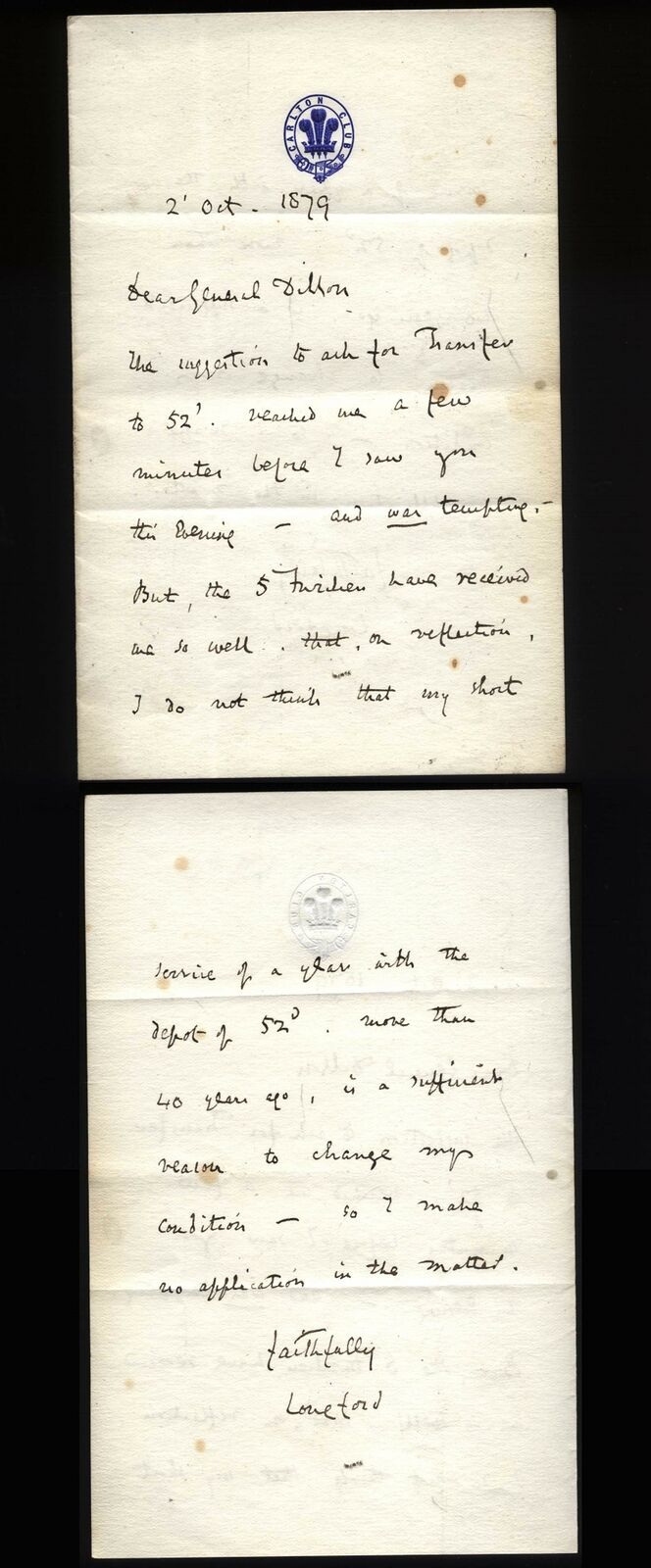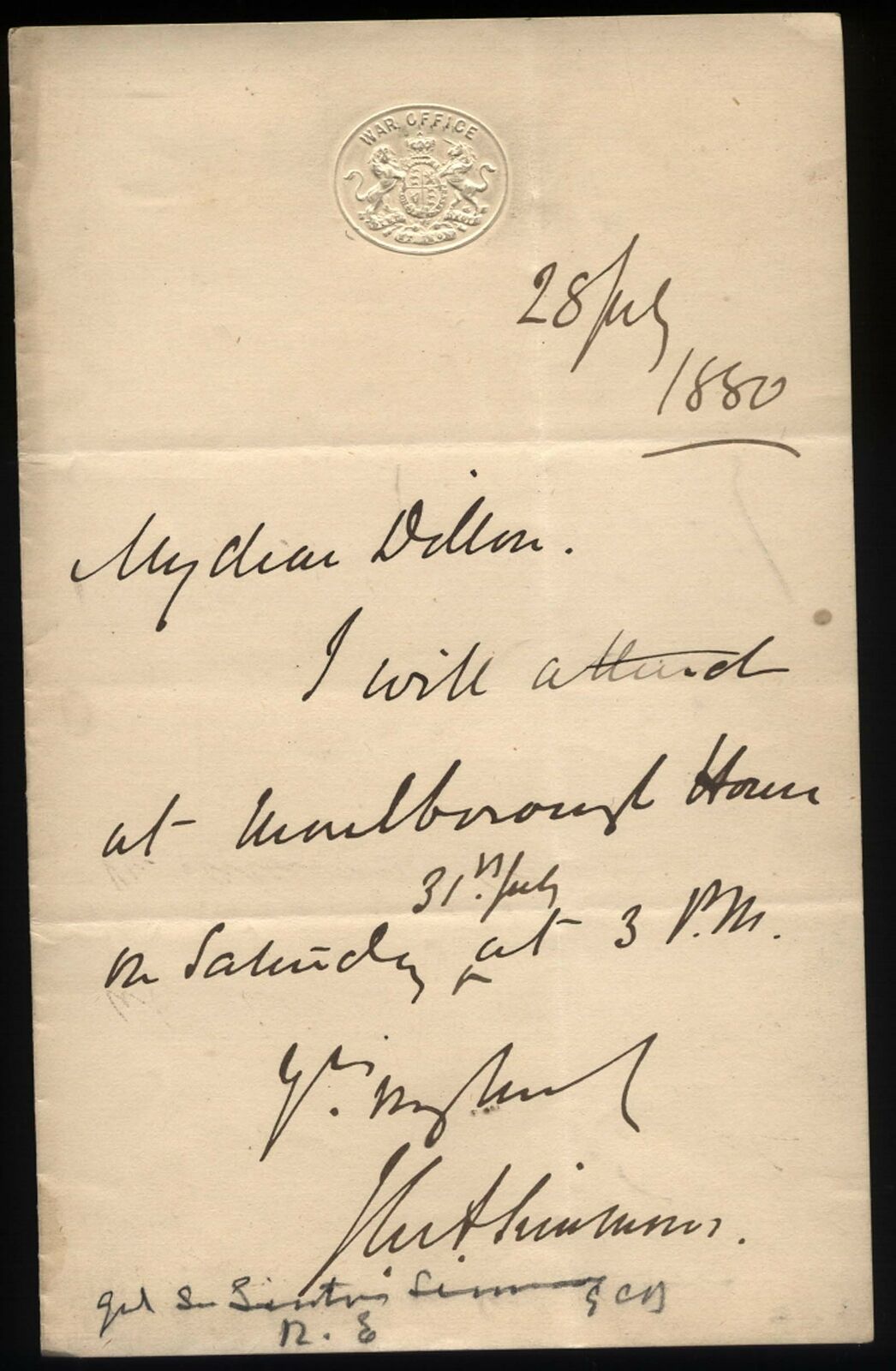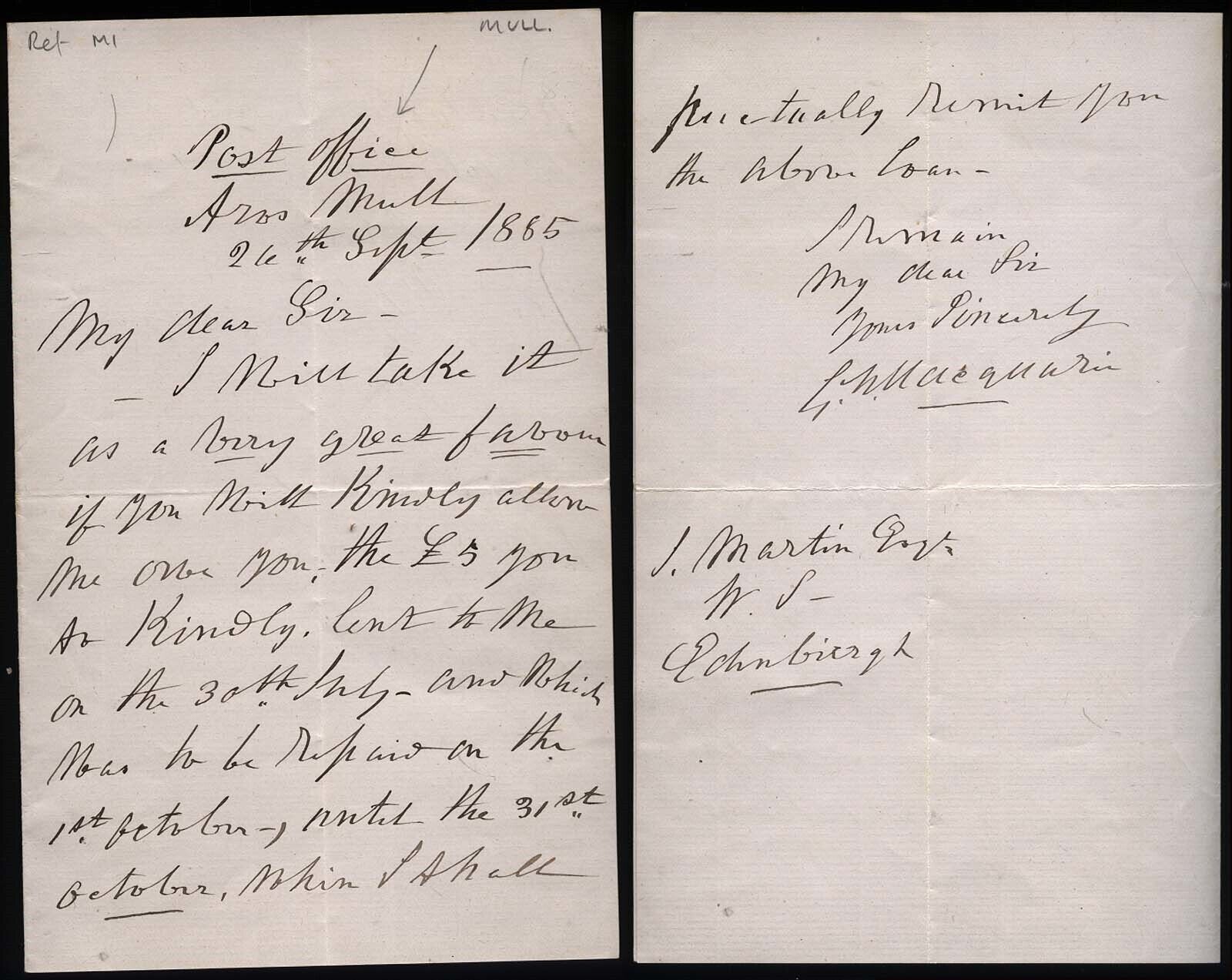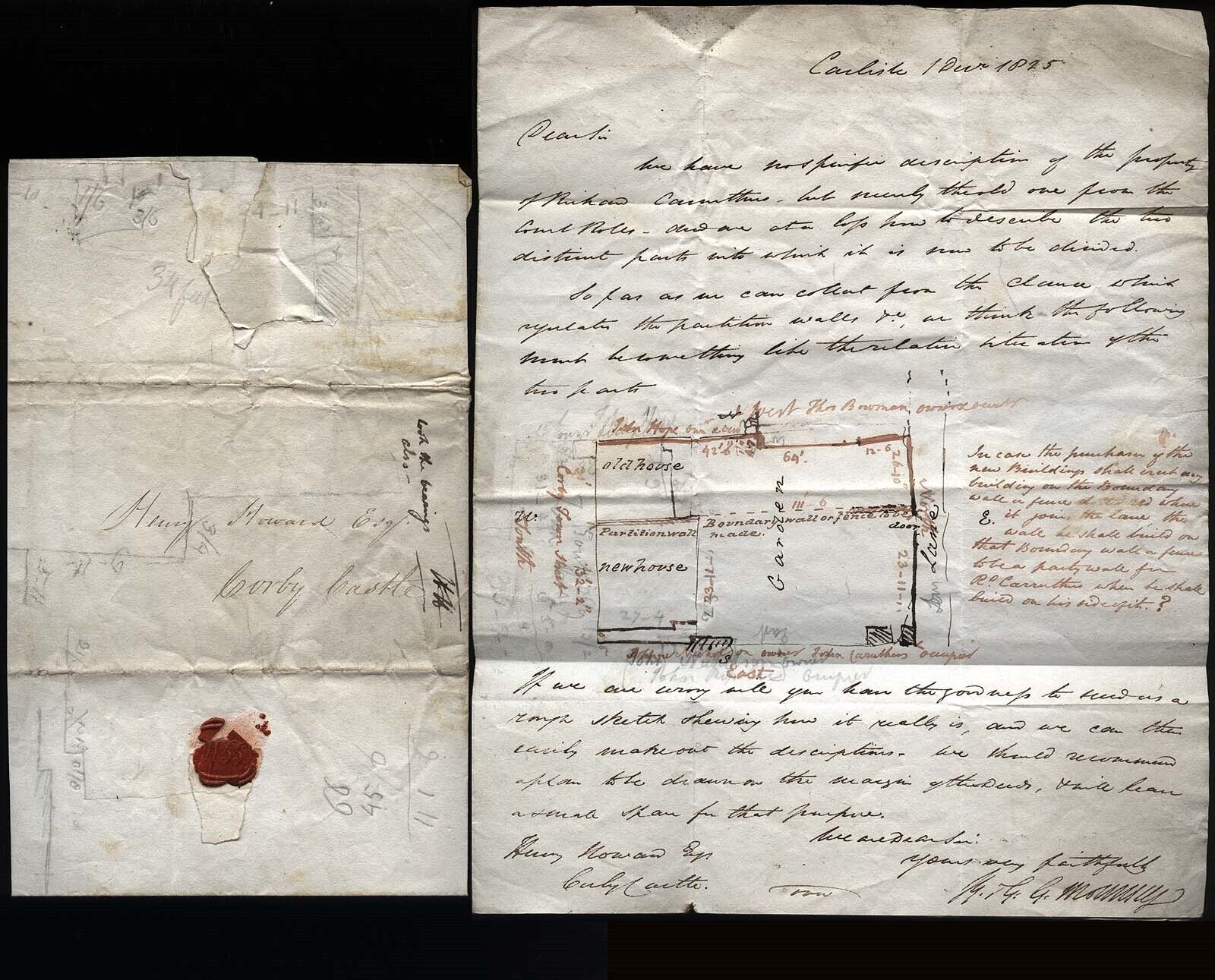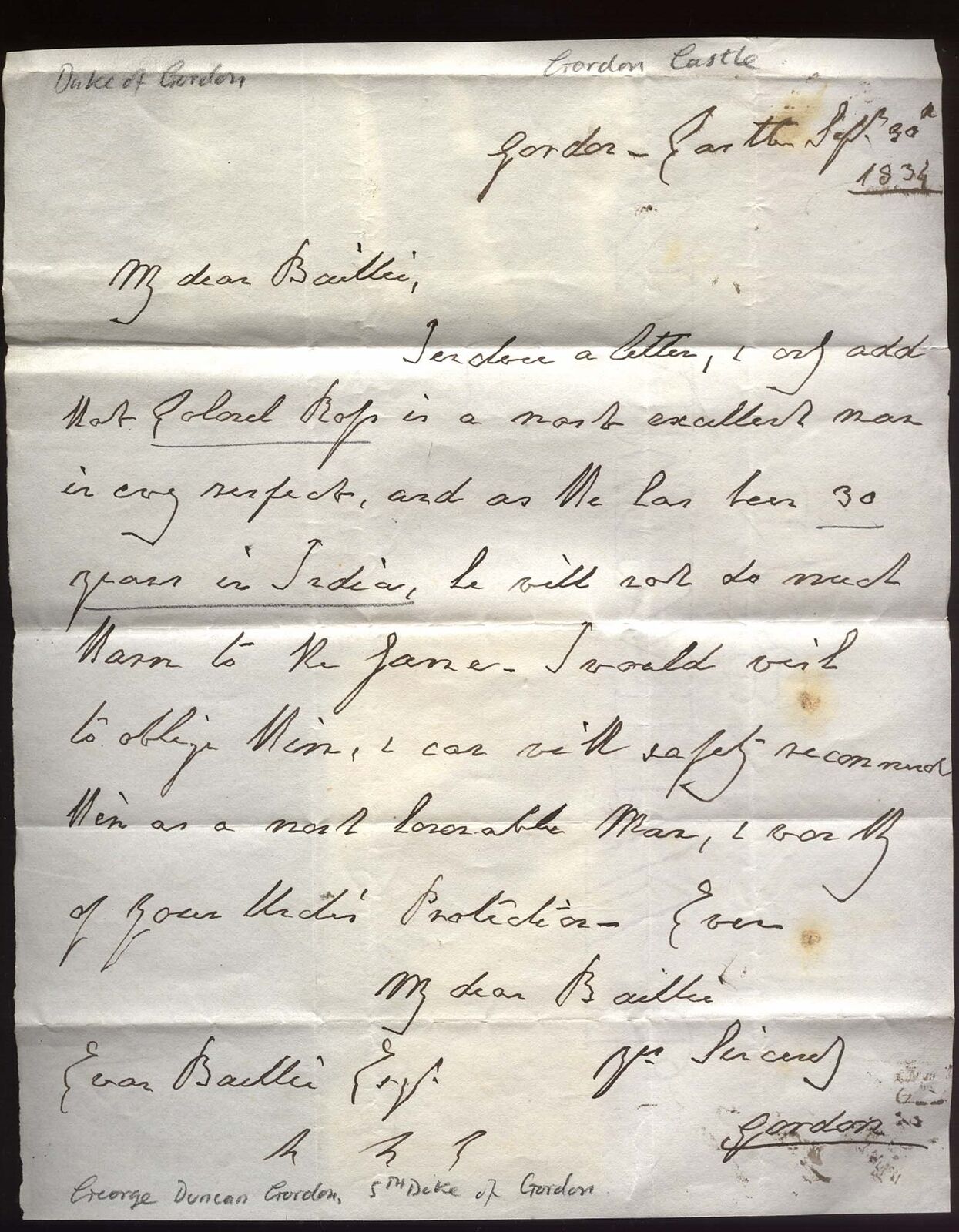-40%
1879 CARLTON CLUB, letter 4th Earl Longford, William Pakenham re FUSILIERS
$ 47.98
- Description
- Size Guide
Description
1879 CARLTON CLUB, letter 4th Earl Longford, William Pakenham re FUSILIERSThis product data sheet is originally written in English.
1879 CARLTON CLUB, letter 4th Earl
Longford
, William
Pakenham
to General Martin Dillon,
formar
ADC to Queen Victoria. turning down a transfer suggestion to the 52nd, wants to stay with the 5th Fusiliers (Northumberland).
General William
Lygon
Pakenham
, 4th Earl of
Longford
GCB
DL
JP
(31 January 1819 – 19 April 1887), styled The Honourable William
Pakenham
before 1860, was an Anglo-Irish soldier and Conservative politician
Early life and education
Pakenham
was the second son of Thomas
Pakenham
, 2nd Earl of
Longford
, by Lady
Georgiana
Emma Charlotte
Lygon
, daughter of William
Lygon
, 1st Earl
Beauchamp
. He was educated at Winchester College and entered the army in 1837. A year prior to his entry into the army,
Pakenham
played a single first-class cricket match for the Gentlemen in the Gentlemen v Players fixture of 1836 at Lord's. He however had no success in the match, twice being dismissed without scoring.
Military career
After service in both the Crimean War and the Indian Rebellion,
Pakenham
became Adjutant-General in India in November 1858. He was also colonel of the Northumberland Fusiliers from 1878 to his death
Public life
He succeeded in the earldom in 1860 on the death of his elder brother, the third Earl and was created
KCB
in 1861. He sat on the Conservative benches in the House of Lords and served as Under-Secretary of State for War from 1866 to 1868 under first the Earl of Derby and later Benjamin Disraeli. In February 1870 he was voted chairman of the Central Protestant Defence Association which was established in response to the Irish Church Act 1869. He also served as Lord Lieutenant of
Longford
from 1874 to 1887. In Dublin, he was a member of the
Kildare
Street Club.
He was created
KCB
in the 1861 Birthday Honours and
GCB
in the 1881 Birthday Honours
Family
Lord Longford married the Honourable Selina Rice-Trevor, daughter of George Rice-Trevor, 4th Baron Dynevor, in 1862. They had four surviving children: Thomas, Lord Pakenham, the Hon. Edward Michael, Lady Georgiana Frances Henrietta (wife of Hugh Gough, 3rd Viscount Gough) and Lady Catherine Louisa (mother of William Fletcher-Vane, 1st Baron Inglewood). Lord Longford died in April 1887, aged 68, and was succeeded in the earldom by his second but eldest surviving son. His grandson Frank Pakenham, 7th Earl of Longford, became a prominent Labour politician.
The Countess of Longford survived her husband by over thirty years and died in January 1918. On 4 May 1836, the 5th became a fusilier regiment and was redesignated as the 5th (Northumberland Fusiliers) Regiment of Foot:
The King has been pleased to command, that the 5th, or Northumberland, Regiment of Foot shall in future be equipped as a Fusilier Regiment, and be styled the 5th Regiment of Foot, or Northumberland Fusiliers.
The regiment, which was increased to two battalions in 1857, saw active service in the Indian Rebellion of 1857 and the Second Anglo-Afghan War in 1880.
The regiment was not fundamentally affected by the Cardwell Reforms of the 1870s, which gave it a depot at Fenham Barracks in Newcastle upon Tyne from 1873, or by the Childers reforms of 1881 – as it already possessed two battalions, there was no need for it to amalgamate with another regiment.[29] At the same time the existing militia and rifle volunteer units of the district became battalions of the regiment. Accordingly, on 1 July 1881 the Northumberland Fusiliers[30] was formed as the county regiment of Northumberland, (including the Counties of the towns of Newcastle upon Tyne and Berwick-upon-Tweed) with the following battalions.
General Sir Martin Andrew Dillon GCB CSI (19 June 1826–1913) was an Irish senior officer in the British Army.
Biography
Dillon was the son of Major Andrew Dillon and entered the British Army in 1843.
He was present as a captain at the Siege of Lucknow during the Indian Mutiny of 1857 and as a major in the subsequent Oudh campaign of 1858. In the China Campaign of 1860 he served as an assistant adjutant-general on the staff of Major-General Sir Robert Napier and as the latter's military secretary in India and Abbysinia. He was Aide-de-Camp to Queen Victoria from 1868 to 1878 when, now promoted Major-general, he was appointed assistant military secretary to Prince George, Duke of Cambridge.
He was knighted as a Knight Commander of the Order of the Bath (KCB) in 1887. Promoted lieutenant-general in 1887 and full general on 16 July 1892, he was given the colonelcy of The Prince of Wales's Own (West Yorkshire Regiment) in 1897, transferring in 1913 to be briefly colonel-commandant of the 1st Battalion of the Rifle Brigade.
Dillon was appointed a Knight Grand Cross of the Order of the Bath (GCB) in the 1902 Coronation Honours list published on 26 June 1902, and was invested by King Edward VII at Buckingham Palace on 8 August 1902
MILITARY SERVICE
Dillon, Gen Sir Martin (Andrew) G.C.C. (1932), K.C.B., (1887), S.I. (1872) Indian Army (retired); b. 1826; entered army, 1843; General, 1892; served in Punjab, 1848-49; Kohat Pass, 1850; Crimea, 1856; Indian Mutiny, 1857-59: China. I860; Abyssinia, 1867-68; Brigade-Major, Nepal Frontier; Assistant, Adjutant-General, China; Military Secretary, Bombay; Military Secretary, Abyssinia. (A.D.C. to the Queen); Military Sec. India; Adj-Gen. Gibraltar; commanded the Lucknow and the Rawalpindi Divisions, India, 1884-88; Col, West Yorkshire Regt. (Prince of Wales Own), 1897, Commissioner, Duke of York’s Royal Military School: Commandant. Rifle Brigade, 1915.
Address: 80, St. Cames Square, S.W. Clubs: United Service.
ARCHIVE MATERIAL FOR Dillon, Sir Martin Andrew (1826-1913) Knight, General is held at
1 1880-96: corresp National Library of Ireland MS 41.682 See Annual Return 2007
2 1890-1901: letters to Earl Roberts National Army Museum Templer Study Centre 7101/23, 8310/155-62 NRA 18656
3 1868-86: corresp British Library: Asian and African Studies MSS Eur F 114 NRA 10012
:
Powered by SixBit's eCommerce Solution
1879 CARLTON CLUB, letter 4th Earl Longford, William Pakenham to General Martin Dillon, formar ADC to Queen Victoria. turning down a transfer suggestion to the 52nd, wants to stay with the 5th Fusiliers (Northumberland). General William Lygon Pakenham, 4th Earl of Longford GCB DL JP (31 January 1819 – 19 April 1887), styled The Honourable William Pakenham before 1860, was an Anglo-Irish soldier and Conservative politician Early life and educationPakenham was the second son of Thomas Pakenham, 2nd Earl of Longford, by Lady Georgiana Emma Charlotte Lygon, daughter of William Lygon, 1st Earl Beauchamp. He was educated at Winchester College and entered the army in 1837. A year prior to his entry into the army, Pakenham played a single first-class cricket match for the Gentlemen in the Gentl
Club Name
Carlton Club
Related Interests
5th Northumberland Fusiliers
EAN
Does Not apply
Country
England
England County
Middlesex
City/Town/Village/Place
London
Family Surname
Pakenham
Theme
Military
Era
1871-1880
Addressed to
General Martin Dillon
Document Type
Manuscript Letter
Year of Issue
1879
Titled Families
Earl of Longford
